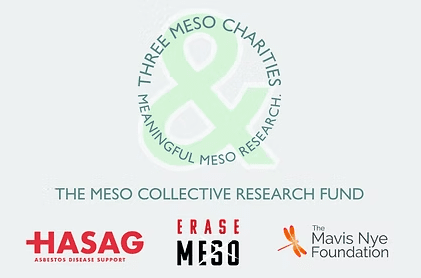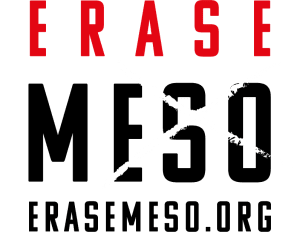Research Studies and Collaborations
New PREDICT-Meso Studies
MesoSCAPE funded by The meso collective research fund
MesoSCAPE: Mesothelioma Spatial Characterisation of Aberrant gene expression Promoting Evolution
Many cancer drugs are targeted at rapidly dividing, mutated cells (e.g. chemotherapy) but these treatments are generally ineffective in mesothelioma. Previous studies of cancer cell DNA also do not explain how mesothelioma develops and why it is so aggressive. This may be because mesothelioma also involves activation of nearby cells and reprogramming of their ‘normal’ functions to favour tumour growth and aggressive behaviour. These cells include ‘fibroblasts’, which support the structure of the cancerbearing tissue, and immune cells, which respond to injury and infection. In this project, we will use state-of-the-art laboratory methods that combine microscopic tissue imaging with RNA sequencing to work out which of the many cells adjacent to mesothelioma cells in tissue biopsies support tumour growth, and how they do this. RNA makes active proteins from coded DNA, so RNA sequencing will reveal which ‘normal’ programs inside nearby cells have been activated (or suppressed). This new information could transform our understanding of how mesothelioma develops and reveal new targets for effective treatment.
PI: Prof Kevin Blyth, University of Glasgow
Co-Is: Prof Nigel Jamieson and Prof Crispin Miller, both University of Glasgow

DEBit-Meso funded by Asthma + Lung UK
DEBiT-MESO: Differential Expression of Bystander Transcriptomes for Mesothelioma Diagnosis, looks to investigate the differing immune profiles between benign disease and malignant mesothelioma. The hypothesis is that signalling molecules released by mesothelioma cells will alter gene expression signatures in nearby leukocyte populations present in pleural effusions, and that transcriptomic analysis of pleural effusion leukocytes will distinguish malignant mesothelioma from benign disease to facilitate early detection and more accurate diagnosis.
PI: Prof Daniel Murphy, University of Glasgow

IAMMED-Meso funded by CRUK Early Detection Award
Integrated analysis in mouse and man for early detection of Mesothelioma (IAMMED-Meso)
Timely diagnosis of mesothelioma is hampered by the cancer’s diffuse growth pattern and a lack of phenotypic markers to differentiate malignancy from reactive pleural inflammation. This programme aims to develop new molecular diagnostics through the cross-species comparison of gene expression changes in both tumour and microenvironment during progression from pre-malignant disease to malignancy.
The programme leverages access to longitudinal patient tissue and pleural fluid samples through the PREDICT-Meso consortium, interwoven with temporal analysis of the Murphy lab’s complex Genetically Engineered mouse models of asbestos-accelerated progressive disease. Cross-species conservation will pinpoint key molecular players that stratify patients for risk of progression to malignant pleural mesothelioma.
PI: Prof Daniel Murphy, University of Glasgow
Co-I: Prof Marion MacFarlane, University of Cambridge- MRC Toxicology Unit

IAMMED-Meso aims to:
Identify features that distinguish high-risk pre-malignant disease from truly benign pleural inflammation at low risk of progression to mesothelioma
Determine how pleural effusion relates to disease progression
Functionally validate our findings in pre-clinical models of pre-malignant disease
WP1 will focus on the solid tissue component of evolving disease;
WP2 on the liquid pleural effusion component;
WP3 on functional validation in ex-vivo and in-vivo models of progression to malignancy
REMIT FUNDED BY CRUK DISCOVEY RESEARCH
REMIT: Reconstructing the In Vivo Evolution of Mesothelioma for Improved Therapy.
This programme aims to fill a crucial knowledge gap in mesothelioma: what happens between the establishment of chronic inflammation and the emergence (some 40 years later) of lethal malignancy? The programme will establish the most physiologically complete and biologically representative in vivo models of human mesothelioma. We will address the basic biological underpinnings of disease evolution in situ, relate our findings to clinical human disease, and use this model to explore exciting new therapeutic strategies to enhance immunotherapy.
PI: Prof Marion MacFarlane, University of Cambridge – MRC Toxicology Unit
Co-I: Prof Daniel Murphy, University of Glasgow

REMIT Aims:
1. To determine the characteristics of asbestos-induced chronic inflammation prior to mutagenesis and how mesothelial mutations alter this landscape
2. To functionally investigate the interactions between developing tumour and immune response and how these change during progression to malignancy
3. To determine which immune effectors mediate responses to immunotherapy in vivo and identify new pathways to improve immunotherapy for mesothelioma.
We will combine state-of-the-art mouse genetics with dose-defined exposure to asbestos in order to interrogate the entire course of disease evolution, from initial inflammation through to lethal malignancy.
Findings will be related to clinical disease using human cell lines from pre-malignant and end-stage mesothelioma, along with live tumour explants that retain their microenvironment.
EXTRA-Meso feasibility study funded by Mesothelioma UK
EXTRA-Meso feasibility study – EXercise TheRApy in Mesothelioma
Mesothelioma UK, the national asbestos-related cancer charity, has awarded a £38,301 grant for an 18-month research project to explore how exercise therapy can improve symptom control, fitness and the quality of life of mesothelioma patients.
The new project, titled ‘EXTRA-Meso feasibility study – EXercise TheRApy in Mesothelioma’, is a collaboration between researchers from the University of Glasgow, NHS Greater Glasgow & Clyde, Manchester University NHS Foundation Trust (MFT) and Greater Manchester Cancer Alliance.
The new study follows the successful Prehab4Cancer and Recovery programme, a free exercise, nutrition and wellbeing scheme in Greater Manchester. It was designed to help people with a recent diagnosis of cancer prepare for and cope better with their treatment.
PI: Dr Selina Tsim, University of Glasgow
Co-I: Dr Matthew Evison, Manchester University NHS Foundation Trust

Dr Selina Tsim from the Institute of Cancer Sciences, University of Glasgow, NHS Greater Glasgow and Clyde, and Chief Investigator for the study said: “A ‘prehab’ exercise and nutrition programme has already proved successful in Greater Manchester and this new study will look at how a similar programme could positively impact the lives of mesothelioma patients. Dependent upon the results of the 18-month study, we hope to move to phase three and deliver a randomised controlled trial.”
For more information on the study or how to apply, patients can contact their Mesothelioma UK Clinical Nurse Specialist, email info@mesothelioma.uk.com or call 0800 169 2409 (freephone) from 9am to 4pm from Monday to Friday. Recruitment for the study will begin in summer 2023.
Leveraging a new class of cancer target for the benefit of mesothelioma diagnosis and treatment funded by ERASE MESO
Mesothelioma UK and Erase Meso, two national asbestos-related cancer charities, have agreed to support a six-month research project to the University of Birmingham’s Institute of Cancer and Genomic Sciences.
The project is a collaboration between Professor Mathew Coleman (University of Birmingham) and Professor Christopher Schofield (University of Oxford) with PREDICT-Meso collaborators Professors Marion MacFarlane and Anne Willis (MRC Toxicology Unit, University of Cambridge) and Professor John Le Quesne (CRUK Beatson Institute, Glasgow)
PI: Prof Mathew Coleman, University of Birmingham
Co-Is: Prof Christopher Schofield, University of Oxford; Prof Marion MacFarlane and Prof Anne Willis, MRC Toxicology Unit University of Cambridge; Prof John Le Quesne, CRUK Beatson Institute, Glasgow

The project is funded by Erase Meso with a financial grant of £37,973 and is aimed at leveraging a new class of cancer target for the benefit of mesothelioma (asbestos-related cancer) diagnosis and treatment. The project will analyse the enzyme MDIG (Mineral Dust Induced Gene) that is known to be altered in the lungs of those in contact with mineral dust like silica. Professor Coleman’s research group have discovered that MDIG is over-represented in mesothelioma cells. By reducing the level of MDIG activity to normal levels, researchers will investigate whether this reduces the growth and survival of mesothelioma cells.

CRUK Scotland Centre
The CRUK Scotland Centre is a partnership between the Universities of Edinburgh and Glasgow, MRC Human Genetics Unit, Cancer Research UK Beatson Institute, NHS Lothian, NHS Greater Glasgow and Clyde- is funded by Cancer Research UK.
Research at the CRUK Scotland Centre is directed at six tumour-focused themes including Mesothelioma.
PREDICT-Meso is proud to work with the Scotland Centre and our collaborators to advance mesothelioma research. Click the button below for more information….
New Collaborations
Circulating tumour DNA
Dr Colin Collins (University of British Columbia, Canada) and his team are interested in investigating the potential of circulating tumour DNA (ctDNA) as an early diagnostic marker and/or disease monitoring tool.
This research area brings together the Collins lab (with funding from WorkSafeBC) and the ASSESS-Meso team, based in Bristol, who will collect suitable additional blood samples from consenting ASSESS-Meso participants, link these with archival tumour samples and the necessary clinical data.
Machine learning and MRI
Professor Alexandre Falcao (Universidade Estadual de Campinas, Brasil) and his team will be working on image processing and machine learning techniques for enhanced analysis of perfusion MRI in mesothelioma.
This project may lead to software developments that enable the maximum clinical benefit to be derived from this promising tool for mesothelioma detection.
AI Volumerty Surgical Validation
Joseph Friedberg (Mesothelioma Surgeon, Pennsylvania, USA) will supply pre-operative CT scans and resected tumour volumes for final validation of the optimised volumetric tumour segmentation AI (WP5.2)
Looking to collaborate?
There are a few ways you can collaborate with the Network:
1) Look at our member profiles, see if there is someone in the area you’re looking to collaborate in, and contact them directly
2) Email us at PREDICT-Meso@glasgow.ac.uk letting us know a bit about you and what kind of collaboration/advise/expertise you are looking for and we’ll do our best to find you someone who can help
3) Check out the CRUK Open Lab Initiative which connects research groups with shared interests. This is an external resource, not PREDICT-Meso affiliated, and covers many cancers- but is a great way to find cross collaboration in other cancer areas. Complete the expression of interest form below to join up
